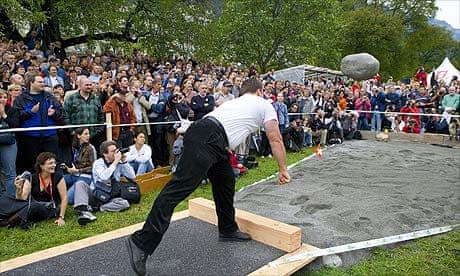As international tourists flock to their country for the Euro 2008 football championship, many Swiss – or at least the majority German-Swiss – remain more passionate about homegrown pastimes than they are about the beautiful game. For disaffected England, Scotland, Wales and Ireland fans disappointed by their teams' failure to qualify, such eye-popping pursuits may just provide a crumb of consolation.
Schwingen
This singular Swiss form of wrestling began as a companionable way of letting off steam after a hard day's work on the farm, and eventually even led to a Eidgenössische Schwing- und Älperfest (Federal Wrestling and Alpine Festival) held every three years. Each combatant wears short jute trousers over their clothes, and must at all times keep a grip on their opponent's pants as they tussle in a sawdust ring for prizes ranging from cowbells to stud bulls. A set of 100 Judo-like manoeuvres, with names like Brienzer, Hüfter, Kurz or Übersprung, are employed in attempts to land the other on their back and thus achieve victory. Although the next federal championship isn't until 2010, regional matches run constantly; among notable upcoming fixtures is one in the capital, Berne, on August 10, where the reigning King of Schwing, Jörg Aberholden, is set to appear. Traditionally a male sport, there's now also a regular women's Schwingen league.
Hornussen
Described as farmer's golf, Hornussen comprises two teams of 16-18 people on a marked-out field. Players line up to whip a puck (Hornuss or hornet) around a metal ramp with a rod and launch it, buzzing, into the air at up to 300kph. Meanwhile, the opposition tries to stop the Hornuss before it hits the ground, using paddles (Schindel) resembling road signs. And they don't merely bat the Hornuss with the Schindel, but often throw the 4kg paddle high into the path of the speeding puck. With competing theories suggesting it either derived from a ferocious war game or was another farmers' invention, this centuries-old sport is most popular in villages around Berne, Solothurn and Aargau. You can catch it in places like Richigen, just west of Bern (June 15 & 28, July 13), before a group final on September 20 in Oberönz-Niederönz, north-east of the capital. Read more match listings (in German).
Steinstossen
Like Scots with their cabers, the Swiss are true heavyweights when it comes to throwing things. At 83.5kg, their country's revered Unspunnenstein (Unspunnen stone) weighs about 10 times as much as an average shot put. The boulder is central to the historic Unspunnenfest alpine games held every 10 years, most recently in 2006. However, as a symbol of Swiss unity, the stone has become a political pawn, too. Several times, it's been kidnapped by the Group Belier, inhabitants of Germanic Berne who want to secede to the French canton of Jura. Repeated theft and damage means a replica is now used for national Steinstossen (stone-throwing) championships. Meanwhile, other heavy-duty boulders take the strain at almost weekly competitions, including in Schwarzsee on June 22.
Kuhfladen-bingo
Kuhfladen-bingo (cowpat bingo) sounds like a pastime dreamt up in an isolated alpine location – which it almost certainly was. It involves hundreds of small squares being chalked out on a field. Then, before one or two cows are released into it, bets are placed on where they will first do their business. Although there are modern-day American, Australian and UK equivalents, several sources suggest the pursuit has deep roots in medieval Germanic village rituals. It's certainly practised enthusiastically in Switzerland, and Ruswil, 20 minutes from Lucerne, usually includes it in its Fäscht celebrations, from August 31 to September 2.
Bürostuhlrennen
A tongue-in-cheek newcomer, Bürostuhlrennen (office-chair racing) places helmeted participants on crazily souped-up pedestals-on-wheels and sets them off on a 300m obstacle course at speeds of up to 40kph. The sport only emerged eight years ago, when an unexpectedly large crowd turned out to cheer on an amateur office-chair motocross in Olten, south-east of Basel. It spread to other towns and villages, a league was formed and by last year the original Olten race was attracting 7,000 spectators. Olten's annual June event is taking a break during Euro 2008, but will return next year. Meanwhile, the village of Löhningen, near Schaffhausen, is holding its race this June 7, mere hours before Euro 2008 kicks off. The sport is also spreading through Germany.
Getting there
Flights: Lufthansa have flights available from London Heathrow to Berne from £299rtn. Search and book flights at travelsupermarket.com
Train: Take the Eurostar from London to Paris, from £59 return. Then a High speed 'Lyria' TGV train from Paris to Bern, from around £23 each way. Find more European rail travel information at seat61.com. Book tickets at raileurope.co.uk
